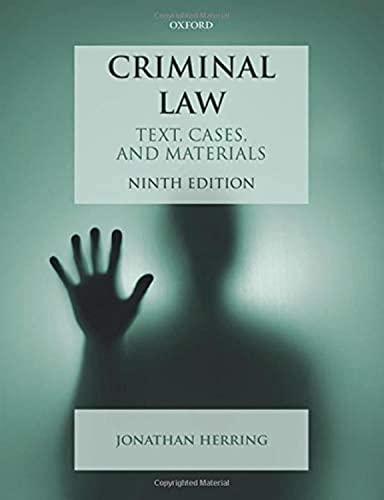Question
Betty and Bob have an adult daughter, Katie, the light of their life. Katie is married to Ken. The two couples are very compatible, and
Betty and Bob have an adult daughter, Katie, the light of their life. Katie is married to Ken. The two couples are very compatible, and decide to live next to each other. Betty and Bob purchase a plot of land, and both couples move their mobile homes onto the land. Over the next years, Katie and Ken pay Betty and Bob on a monthly basis to cover part of the bills, including taxes and insurance and utilities. When money is good, they pay more; when things are tight they pay less. Ken digs a trench and water lines, improves the property for everyone living there; and the four enjoy many years of family bliss.
But after 10 years Betty dies. Then, the next year Katie died. Now Ken and his father-in-law Bob live there, alone in their separate mobile homes. After a number of years Bob tells Ken he doesn't need to pay any more money, "I am getting social security now."
Now 22 years from when they moved in, Ken wakes up to a "for-sale" sign in his front yard and Bob is gone. Bob is now 78, has some dementia issues, and wants to go live with his other kids in Kansas. Bob tells Ken that he is going to sell the land, so Ken will have to move. Ken says, "well what about my half"", and Bob says, "no, you don't own anything - my name is on the deed, and it's my land."
Ken immediately seeks legal counsel. His attorney files a petition to quiet title, seeking partition of the land, a declaratory judgment that there was an oral contract between the parties which entitles Ken to half the land, or alternatively a declaratory judgment that the agreement created a constructive trust. Bob's answer denies any relationship or agreement ever occurred.
At trial, Ken puts on evidence of the payments to Bob and the 22 years he and his deceased wife Katie lived on the land with Bob and Betty. At the end of his case-in-chief, Bob's attorney moves for a directed verdict.
Should the court find a constructive trust existed?
A) Yes, the court finds a constructive trust due to the confidential relationship of the parties and orders partition of the property.
B) No, the court does not find a constructive trust because there is not evidence of an actual agreement.
C) Yes, the constructive trust is essential to prevent unjust enrichment by Bob.
D) No, because title was not acquired with the money of Ken and Katie.
E) No, because an equitable lien would be proper.
Step by Step Solution
There are 3 Steps involved in it
Step: 1

Get Instant Access to Expert-Tailored Solutions
See step-by-step solutions with expert insights and AI powered tools for academic success
Step: 2

Step: 3

Ace Your Homework with AI
Get the answers you need in no time with our AI-driven, step-by-step assistance
Get Started


